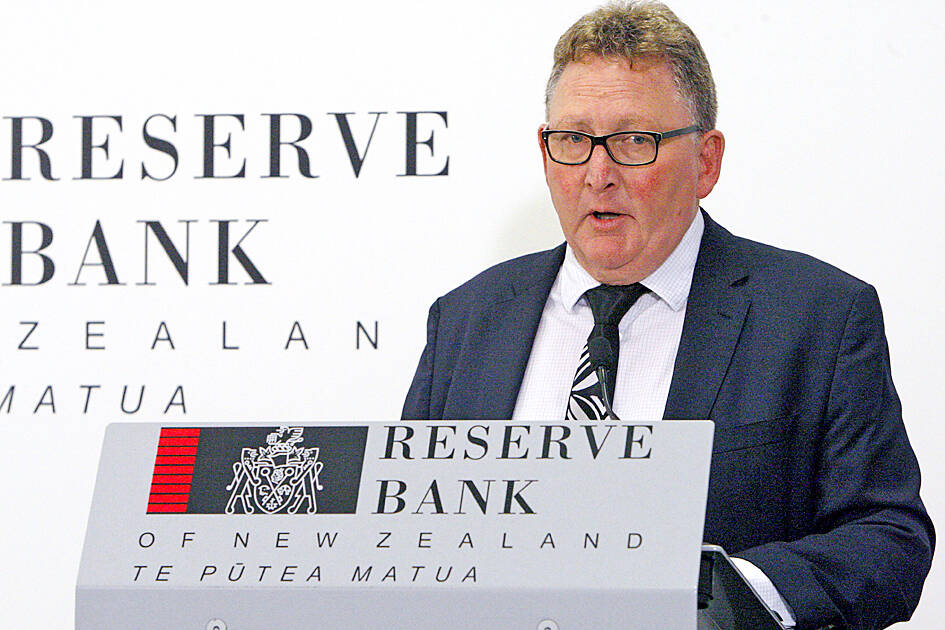New Zealand’s central bank yesterday raised interest rates by a quarter-percentage point and unexpectedly signaled that no further policy tightening would be needed to tame inflation, sending the nation’s currency tumbling.
The Reserve Bank of New Zealand’s (RBNZ) Monetary Policy Committee lifted the official cash rate (OCR) to 5.5 percent from 5.25 percent, as expected by 18 of 21 economists surveyed by Bloomberg.
The central bank’s forecasts show the OCR has now peaked, with cuts beginning in the third quarter of next year.

Photo: AP
The New Zealand dollar dropped as much as 1.3 percent to its lowest since May 2 as traders were surprised by the committee’s decision not to keep the door open to further tightening.
The currency bought US$0.6168 at 4:22pm in Wellington. The yield on policy-sensitive two-year bonds dropped the most in six months.
New Zealand has been in the vanguard of global tightening, with its 525 basis points of rate hikes outpacing even the US Federal Reserve.
The RBNZ has been trying to rein in a sharp burst of inflation and yesterday’s decision suggests it is now relying on the lagged impact of higher borrowing costs to keep cooling consumer prices.
“The real surprise for the market was the RBNZ effectively declaring ‘mission accomplished’ on rate hikes,” said Prashant Newnaha, senior Asia-Pacific rates strategist at TD Securities in Singapore. “Quite clearly this is a board that is content moving to the sidelines, letting prior rate hikes and expectations of the economy entering recession to naturally drive inflation down.”
Still, the bank’s forecasts show a shallower economic slowdown, with only a mild recession projected for the second and third quarters of this year.
“The committee is confident that with interest rates remaining at a restrictive level for some time, consumer price inflation will return to within its target range of 1-3 percent per annum,” the RBNZ said. “Inflation is expected to continue to decline from its peak and with it measures of inflation expectations.”
Inflation slowed to 6.7 percent in the first quarter and the central bank predicts it would return to its target band by the third quarter of next year.
Most economists expected it to keep the door open for a further rate increase if needed, arguing that surging immigration and looser fiscal policy would add to price pressures.
By contrast, the committee’s record of the meeting showed members discussed the option of keeping rates unchanged and voted 5-2 in favor of a hike.

When an apartment comes up for rent in Germany’s big cities, hundreds of prospective tenants often queue down the street to view it, but the acute shortage of affordable housing is getting scant attention ahead of today’s snap general election. “Housing is one of the main problems for people, but nobody talks about it, nobody takes it seriously,” said Andreas Ibel, president of Build Europe, an association representing housing developers. Migration and the sluggish economy top the list of voters’ concerns, but analysts say housing policy fails to break through as returns on investment take time to register, making the

‘SILVER LINING’: Although the news caused TSMC to fall on the local market, an analyst said that as tariffs are not set to go into effect until April, there is still time for negotiations US President Donald Trump on Tuesday said that he would likely impose tariffs on semiconductor, automobile and pharmaceutical imports of about 25 percent, with an announcement coming as soon as April 2 in a move that would represent a dramatic widening of the US leader’s trade war. “I probably will tell you that on April 2, but it’ll be in the neighborhood of 25 percent,” Trump told reporters at his Mar-a-Lago club when asked about his plan for auto tariffs. Asked about similar levies on pharmaceutical drugs and semiconductors, the president said that “it’ll be 25 percent and higher, and it’ll

CHIP BOOM: Revenue for the semiconductor industry is set to reach US$1 trillion by 2032, opening up opportunities for the chip pacakging and testing company, it said ASE Technology Holding Co (日月光投控), the world’s largest provider of outsourced semiconductor assembly and test (OSAT) services, yesterday launched a new advanced manufacturing facility in Penang, Malaysia, aiming to meet growing demand for emerging technologies such as generative artificial intelligence (AI) applications. The US$300 million facility is a critical step in expanding ASE’s global footprint, offering an alternative for customers from the US, Europe, Japan, South Korea and China to assemble and test chips outside of Taiwan amid efforts to diversify supply chains. The plant, the company’s fifth in Malaysia, is part of a strategic expansion plan that would more than triple

Taiwanese artificial intelligence (AI) server makers are expected to make major investments in Texas in May after US President Donald Trump’s first 100 days in office and amid his rising tariff threats, Taiwan Electrical and Electronic Manufacturers’ Association (TEEMA, 台灣電子電機公會) chairman Richard Lee (李詩欽) said yesterday. The association led a delegation of seven AI server manufacturers to Washington, as well as the US states of California, Texas and New Mexico, to discuss land and tax issues, as Taiwanese firms speed up their production plans in the US with many of them seeing Texas as their top option for investment, Lee said. The